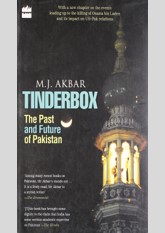Tinderbox: The Past And Future Of Pakistan
4
Indians and Pakistanis are the same people: why then have their nations moved on such different trajectories since freedom in 1947? Pakistan was the culmination of a search for what might be called 'Muslim space' that began during the decline of the Mughal Empire. Mohammad Ali Jinnah wanted a secular nation with a Muslim majority, just as India was a secular nation with a Hindu majority. The father of Pakistan did not realize that there was another claimant to the nation he had delivered: Maulana Maududi, founder of the Jamaat-e-Islami, the godfather of Pakistan. In Tinderbox: The Past and Future of Pakistan, M.J. Akbar embarks on a historical whodunnit to trace the journey of an idea, and the events, people, circumstances and mindset that divided India. He brings an impressive array of research, perception and analysis to solve this puzzle with a fluent, engaging narrative style, making a difficult subject deceptively accessible. There could be no better guide to the subcontinent's past, and a glimpse into its future.

